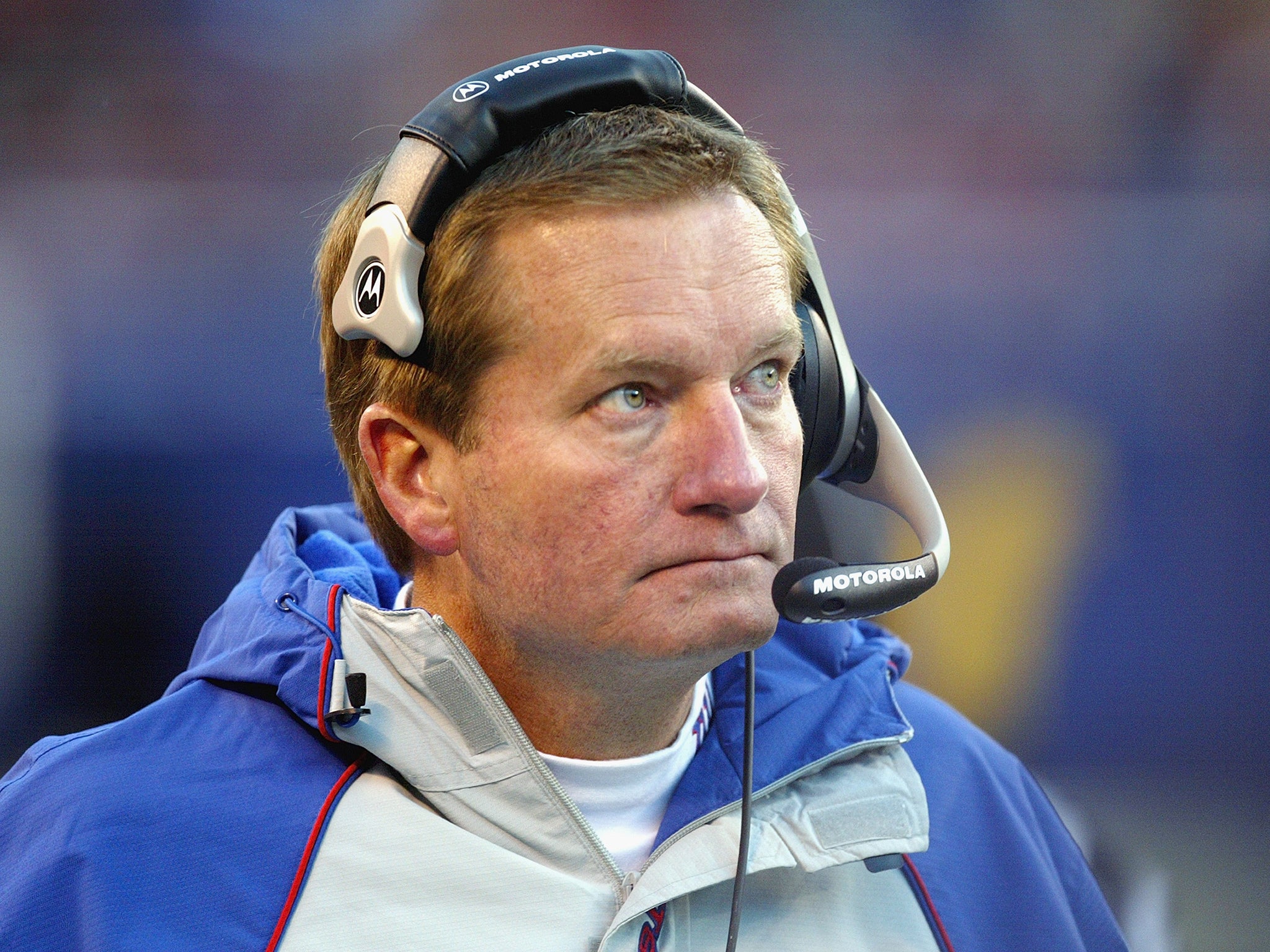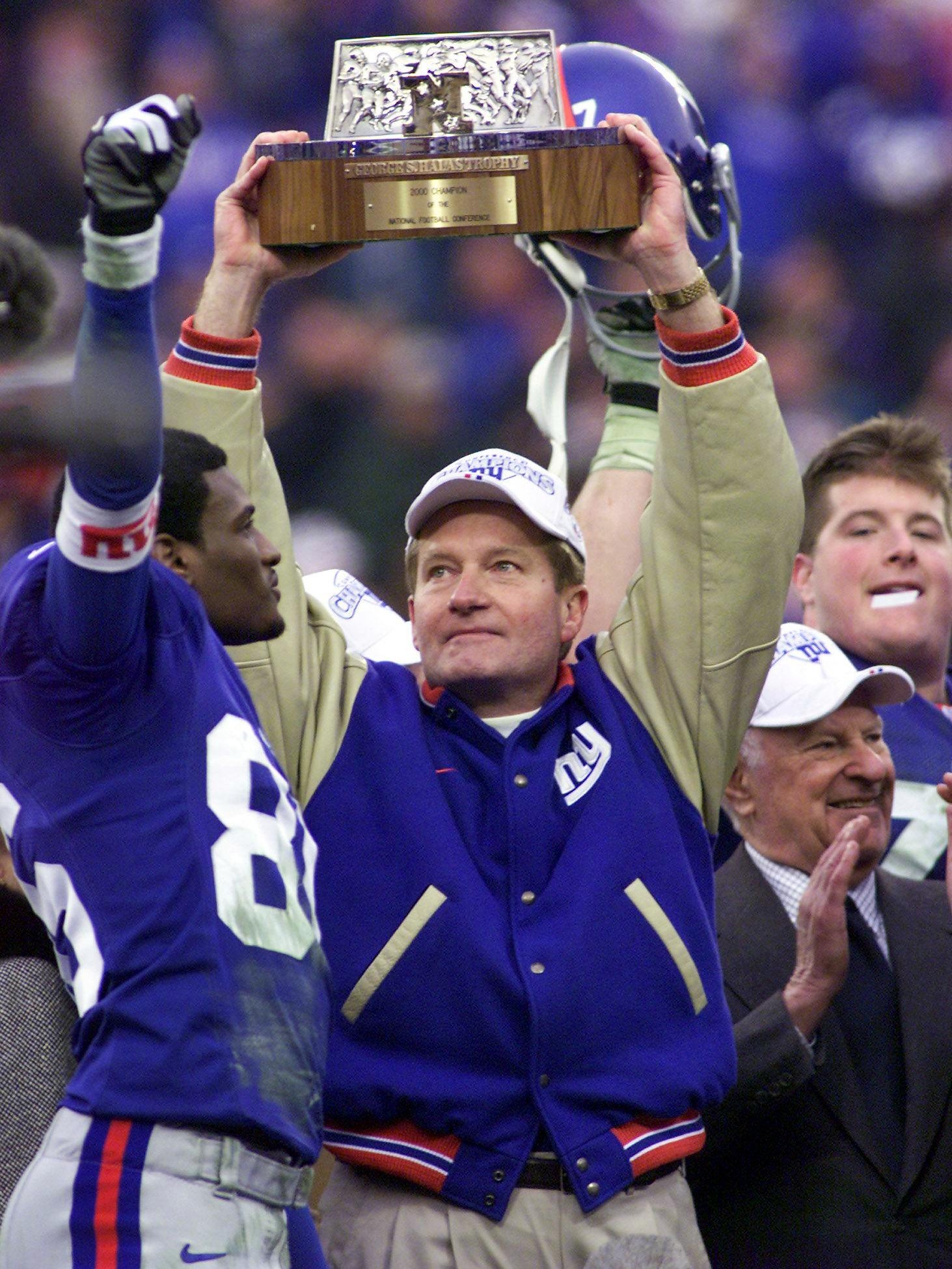Jim Fassel: NFL coach who led New York Giants to the Super Bowl
A standout quarterback himself as a young man, Fassel was admired for his commitment and precision in preparing his players

Jim Fassel, who coached the New York Giants to a Super Bowl appearance in 2001, and mentored Hall of Fame quarterback John Elway early in his career, has died aged 71.
Fassel (pronounced “fossil”) was known throughout his career for developing strong offensive attacks built around passing. He had been a quarterbacks coach, offensive coordinator and college head coach before being named head coach of the Giants in 1997.
The team was coming off a 6-10 season and had the worst-rated offence in the National Football League. When he introduced himself to his players, Fassel said the work ahead would be as tricky as riding a bicycle across a tightrope.
“I’m the one driving the bike,” he said. “Who’ll risk everything to jump on and come with me?” The players slowly raised their hands until all had pledged to ride the bike together.
Fassel installed a new offensive system, a variant of Bill Walsh’s west-coast style of offence that relied heavily on passing. The emphasis was on precision, with running plays strategically mixed in with short passes. The formula had served Fassel well in the Eighties at the University of Utah, where his teams set national records for passing and offensive yardage.
But when the Giants lost three of their first four games, some fans were calling for Fassel to be fired. His team had few well-known players – the quarterbacks were journeymen Dave Brown and Danny Kanell – but the Giants began to click, and ended the season with a record of 10-5-1. They lost by one point to the Minnesota Vikings in a wild-card playoff game, and Fassel was named the NFL’s coach of the year.
The Giants struggled through the next two seasons, with records of 8-8 and 7-9. In November 2000, they were 7-4 and had lost two games in a row when Fassel announced, “I’m raising the stakes right now. This is a poker game. I’m shoving my chips to the middle of the table. I’m raising the ante. Anybody wants in, get in. Anybody wants out, get out. This team is going to the playoffs.”
The brash prediction ignited his players, led by quarterback Kerry Collins, running back Tiki Barber and defensive end Michael Strahan. The Giants finished the season with five straight victories and won the NFC east division. New York then won two playoff games to advance to the Super Bowl, only to lose to the Baltimore Ravens 34-7.
The next year, the Giants were only 7-9, but in 2002 they bounced back to finish 10-6. Late in the third quarter of a wild-card playoff game against the San Francisco 49ers, the Giants led 38-14.
The 49ers chipped away, scoring two touchdowns, each with a successful two-point conversion, and a field goal. A Giants player dropped a pass in the end zone. Another player was whistled for two personal fouls, and the 49ers edged ahead 39-38 with one minute to play.
The Giants were able to get into position for a possible game-winning 41-yard field goal, but the snap skidded along the turf. The holder, Matt Allen, picked up the ball and attempted a running pass as penalty flags fell on the field. The Giants pointed to a defensive player who had interfered with the intended receiver.

“It was pass interference,” Fassel said after the game. “It was clearly pass interference. How they missed that, I do not know.”
Instead, the Giants were called for having an ineligible receiver downfield. The game was over, with the 49ers claiming a one-point victory.
A day later, the NFL’s head of officiating called Fassel to apologise for the missed call, but the outcome didn’t change. It was perhaps the best-known game that Fassel ever coached. “That loss hurts about as much as any loss I’ve had in my life,” he said. “It’s tragic.”
The effects of that game lingered into the next season, and the Giants couldn’t get on track. They finished with a record of 4-12 and lost their last eight games. Fassel resigned at the end of the season and never became an NFL head coach again. His 58 wins during his seven years in New York are the fourth most of any coach in franchise history.
James Edward Fassel was born on 31 August 1949, in Anaheim, California. His mother was a homemaker, and his father was a firefighter and the equipment manager at his son’s high school.
Fassel was a standout quarterback who led what was then Fullerton Junior College to a 25-1 record in two seasons, including a national two-year college championship. He then spent a year at the University of Southern California before transferring to Long Beach State, from where he graduated in 1972.
He was on the roster of three NFL teams in 1972 without playing in a game. He briefly played for the Hawaiians in the short-lived World Football League before beginning his coaching career. As the offensive coordinator at Stanford from 1979 to 1983, he recruited Elway, who became an all-American quarterback.
Fassel was head coach at Utah from 1985 to 1989 and spent two years with the Giants in the early Nineties as quarterbacks coach and offensive coordinator, coaching quarterback Phil Simms. Fassel had coaching stints with the Denver Broncos (where he was reunited with Elway), Oakland Raiders and Arizona Cardinals, before the Giants named him head coach.
He later served as offensive coordinator for the Ravens, and as a broadcaster, before returning to the sidelines in 2009 with the Las Vegas Locomotives in the start-up United Football League. Fassel won two championships before the league folded in 2012. He was still hoping for another shot at the NFL, but it never came.
Fassel’s 35-year marriage to Kathryn “Kitty” James ended in divorce in 2006. They remarried six years later. Their eldest son, born when they were teenagers, was given up for adoption at birth. The Fassels met him for the first time in 2003 and considered him a member of the family, along with their four other children and 16 grandchildren.
Fassel was a methodical worker who was in his coaching office every day by 5.30am. In developing a game plan, he said, nothing was more important than preparation: “You have to be exact and you have to be constant. There is no room for ‘We tried hard, but…’: we’re professionals, and we have to get it right.”
Jim Fassel, coach, born 31 August 1949, died 7 June 2021
©The Washington Post

